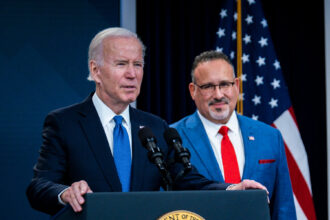Research from the Higher Education Policy Institute indicates that voting during summer vacation could be a strategic error.
Based on an estimate of how students’ voters could impact the outcome of the UK general election, over 30 conservative seats could be won or lost by students going home for the summer.
Cabinet Minister Esther McVey’s Tatton constituency is among the 35 suburban or rural seats where Tory aspirations may be shattered by students registered to vote at home rather than at their university during the academic year.
The National Union of Students (NUS), which is pushing its members to register to vote, issued a warning before Tuesday’s deadline.
According to a voting analysis by the Higher Education Policy Institute (HEPi), the Conservative Party’s attempt to reverse its losses may be hampered by the strategic error of holding the general election over the summer break. Polling among adults in the 18- to 24-year-old range indicates very weak support for the party.
According to Josh Freeman, HEPi’s policy manager and analysis author, “The general elections in 2024 will be unusual. Since most of the recent elections occurred during the academic year, the Labour Party has won a large majority in constituencies with high student voter turnover. However, many of these students will return to their residences in 2024. Some of these happen to the safe seats the Conservatives are now trying to defend.
According to the Hepi analysis, based on student electoral registrations and YouGov constituency forecasts from earlier month, McVey, the Cabinet Office minister initially elected MP for Tatton in 2017, will struggle to hold on to her seat.
According to a YouGov poll, the redesigned constituency is evenly split between McVey and Ryan Jude, her Labour opponent. According to HEPi’s analysis, 1,800 represent 2.4% of the electorate, more than the leading candidates’ margin separation, as YouGov predicted.
“By calling the election at a time when young people are highly politicized, highly engaged and desperate for a change, the prime minister could have handed student voters not just the keys to the university towns but to the country,” according to Chloe Field, vice-president of the National Union of Students (NUS) for higher education.
It is the responsibility of all politicians to listen to us and provide a convincing solution: bring back maintenance grants, abolish tuition fees and rent controls, and give young people a reason to vote enthusiastically.
Labor and Conservation Party have so far offered little aimed at the student’s voters. While the Labour Party promised a secure future for higher education, the Conservation Party manifesto called for expanding apprenticeships in place of low-value degrees.
If in government, both the Liberal Democrats and the Labour Party want to reform higher education finance, while the Green Party plans to abolish tuition fees and bring back the maintenance grant.
In a HEPi survey of 10,000 undergraduates earlier this year, 69% of the respondents said they are registered only at their residence, while 15% are registered at both their residence and term-time. Students can register at their permanent residence and term-time, but they can only vote once.
However, only 68% of the students, including 66% of those under the age of 21, said students said they were planning to vote in the general election.
The National Union of Students (NUS) campaigns for students to vote, including offering students a free CitizenCard photo ID, which can be used as voter identification in England, Scotland, and Wales. Over 21,000 students have signed up to his offer so far.
Freeman agreed that given the timing of the elections, student turnout may be stronger than usual and advised them to take the time to register so that they aren’t kicking themselves on July 5th.
“And the political parties should consider carefully how they can win over students on election day regardless of whether they have previous drawn a lot of students voters,” according to Freeman.














